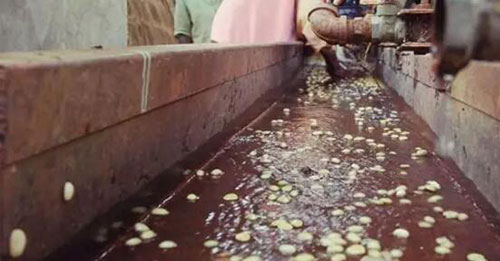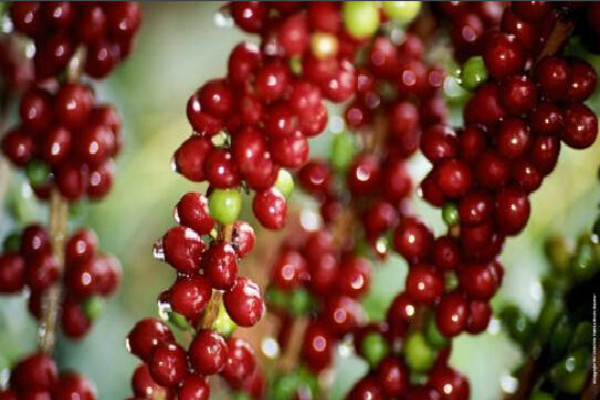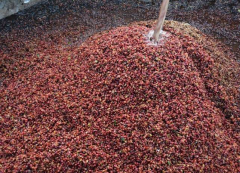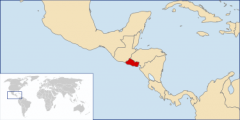Buf Cafe small Farm in Rwanda details the description of the flavor of washed red bourbon
For professional baristas, please follow the coffee workshop (Wechat official account cafe_style)

Rwanda Red Bourbon-Buf Caf é small Farm
Rwanda is located in the heart of the interior of Africa. Its fertile mountain terrain and ancient traditional bourbon species indicate that the natural environment needed to grow high-quality coffee beans can be seen everywhere in Rwanda. Coffee was introduced to Rwanda by German missionaries in 1904 and began to flourish in 1930 because it was the only income-earning crop for rural farmers. Whether it was Arabica harvested in March-June or Robsta harvested in May-June, the government encouraged in effect ordering the production of low-quality and high-yield coffee, even though poor quality played an important role in Rwanda's economic development at that time, because it was one of the few crops that could earn cash, but as global coffee prices collapsed, it continued to promote the policy of exporting low-quality Arabica coffee. Changes are bound to be made.
The 1994 genocide claimed nearly 500000 lives and almost wiped out the knowledge and technology of coffee bean growing. at the same time, coffee prices around the world fell sharply, making Rwanda's coffee industry even worse. The coffee industry in Rwanda is now on the rise again, hoping to re-establish the infrastructure needed for the production and processing of boutique coffee beans at a steady pace, most notably the Joint enhanced Rwanda Agricultural Partnership (PEARL), which is mainly to help Rwanda rebuild agricultural institutions, production capacity and cultivate agricultural talent to help local small farms sell coffee beans directly to buyers in the boutique coffee market. Unlike neighboring Kenya, Ethiopia has a centralized auction system, but its agricultural cooperatives can trade directly with buyers. However, if coffee beans are to be exported from landlocked countries, they must travel 1500 kilometers to the port of Mombasa Mombasa in Kenya or the port of Dares-Salam Dar es Salaam in Tanzania, after 2007 & # 39 After the rehearsal of the Crop of Gold' Golden Bean Competition, Rwanda held its first COE coffee competition in 2008, which drew more buyers' attention to the high-quality bourbon beans produced in Rwanda.
In 2011.6, the 100% red bourbon was planted more than 1900 meters south of Rwanda. Epiphanie Mukashyaka is the owner and operator of the farm. She is a very active female entrepreneur and a model for women entrepreneurs in the coffee industry and other industries in Rwanda. Epiphanie lost her husband in the 1994 genocide, but she chose to stick to the small coffee farm left by her family. And began to actively rebuild and develop the cause with the local people. Buf Caf é, founded by Ms. Epiphanie Mukashyaka, has been in operation since 2000, during which she borrowed money from the Development Bank of Rwanda and received assistance from the Joint strengthening Rwanda Agricultural Partnership Program (PEARL Programme).

Buf Caf é now owns two water washing plants, grows its own coffee trees and buys coffee cherries from more than two thousand small farms nearby. Some of these small farmers are directly employed by Buf Caf é or work in Buf Caf é washing plants, where their wages are higher than the local average. Buf Caf é believes that if employees get higher wages, they will be more willing to pay attention to their work and take pride in the good quality of the coffee produced by Buf. It turns out that this idea is correct. Buf's quality control is very strict. Several batches of coffee won in Rwanda's COE Coffee Competition in 2008 and 2010 respectively. It is the best coffee company in Rwanda. The income from selling coffee is mainly used to go to school for children, medical expenses and investment in other poultry and livestock (such as buying a dairy cow to get milk for local sale). Direct Coffee introduces the top red bourbon beans of Buf Cafe, which are harvested by hand and washed by hand and dried in a traditional African-style high bed.
Property Characteristics: farm characteristics
Farm Farm name: Buf Caf é and more than 2, 000 other small-scale farms
Farm owner: Epiphanie Mukashyaka
Region producing area: Nyamagabe district, Southern Province Nima Gabe district, southern province
City City: located in Butare and Cyangugu

Country country: Rwanda Rwanda
Altitude altitude: 1600-1900 m
Coffee Characteristics: coffee characteristics
Variety variety: Red Bourbon red bourbon
Processing System treatment: Fully Washed and dried on African beds Water treatment African (Solar) elevated bed drying
Flowering period flowering period: September-October September to October
Harvest period harvest time: March-July March to June
Appearance appearance: 16-17 mesh
Aroma aroma / flavor flavor: vanilla, cherry, pudding, coriander, cinnamon, cloves, almonds, caramel, dark chocolate, honey, sugar
Acidity: plum, grapefruit, plum, BlackBerry, malic acid, dense, tartaric acid (grape), sharp and bright acid, refined acidity, acid stimulates mouth secretion
Complex complexity and other other: clean and juicy, bright and lively, round and warm taste, unrestrained flowers and plants, the aftertaste is very sweet, the flavor goes up
Important Notice :
前街咖啡 FrontStreet Coffee has moved to new addredd:
FrontStreet Coffee Address: 315,Donghua East Road,GuangZhou
Tel:020 38364473
- Prev

Kenya Lenana Coffee Cooperative small Farm detailed description of Flavor
For the exchange of professional baristas, please follow the coffee workshop (Wechat official account cafe_style) Kenya AA-Lenana coffee cooperative small farm Kenya is a model country for producing fine coffee beans. Coffee was introduced from Britain in 1900, and only traditional Arabica did not have the best SL28 and SL34 in Kenya until 1950.
- Next

Flavor characteristics of Salvadoran Coffee the planting situation of Salvadoran Coffee and the meaning of HIU Plan
For the exchange of professional baristas, please pay attention to the coffee workshop (Wechat official account cafe_style) among the countries of origin in Central America, El Salvador can be said to be the smallest country in land area. Although coffee production is much less than other countries, the Pacific sea breeze and volcanic environment provide El Salvador coffee farmers with unique planting advantages and diversified flavor tables.
Related
- Detailed explanation of Jadeite planting Land in Panamanian Jadeite Manor introduction to the grading system of Jadeite competitive bidding, Red bid, Green bid and Rose Summer
- Story of Coffee planting in Brenka region of Costa Rica Stonehenge Manor anaerobic heavy honey treatment of flavor mouth
- What's on the barrel of Blue Mountain Coffee beans?
- Can American coffee also pull flowers? How to use hot American style to pull out a good-looking pattern?
- Can you make a cold extract with coffee beans? What is the right proportion for cold-extracted coffee formula?
- Indonesian PWN Gold Mandrine Coffee Origin Features Flavor How to Chong? Mandolin coffee is American.
- A brief introduction to the flavor characteristics of Brazilian yellow bourbon coffee beans
- What is the effect of different water quality on the flavor of cold-extracted coffee? What kind of water is best for brewing coffee?
- Why do you think of Rose Summer whenever you mention Panamanian coffee?
- Introduction to the characteristics of authentic blue mountain coffee bean producing areas? What is the CIB Coffee Authority in Jamaica?

